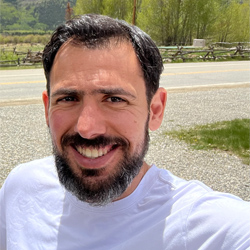
Michael Halassa
School of Medicine, Tufts University, Boston, US
RESEARCH INTEREST:
Mike Halassa is an Associate Professor in the Department of Neuroscience at Tufts University School of Medicine. He has been studying Thalamocortical interactions since his postdoctoral training. His early work focused on the thalamic reticular nucleus and its role in regulating sensory processing and attention. His current focus is on the Mediodorsal thalamus and its interactions with the Prefrontal cortex in the context of higher cognition. Work in the lab stretches across species and involves experiments, modeling and theory. An important goal for the lab is connecting the basic science on thalamocortical function to applications relevant to their perturbation in disorders such as schizophrenia.
Keynote Talk: Thalamocortical interactions in cognitive control and flexibility
Interactions between the thalamus and cortex are critical for cognition but the exact contribution of the thalamus has been unclear. Classical theories depict thalamic relay of signals to or between cortical areas, but recent studies have highlighted the existence of bona fide thalamic computation and a diversity of thalamic output patterns capable of non-relay functions. In this talk, I will discuss findings that highlight the role of the mediodorsal (MD) thalamus in generating unique task-relevant variables and regulating prefrontal excitatory/inhibitory balance and effective connectivity during decision making. These findings indicate a role for the MD thalamus in hierarchical reasoning by engaging computations relevant to credit assignment. In addition to being central to many higher level cognitive processes, these computations are perturbed in schizophrenia. If time allows, I will present work that directly shows this link and our collaborative efforts to identify biomarkers and treatment targets.


